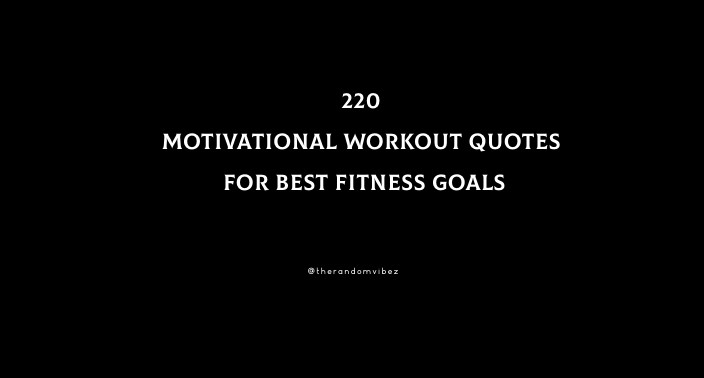In our busy lives, staying super-focused can be tricky. It’s like trying to catch fireflies at night – you think you’ve got one, and then it slips away. But don’t worry, we’re here to make focusing easier.
Ever caught yourself daydreaming when you should be working or studying? We’ve all been there. But fear not, because today, we’re unleashing some amazing tips to help you master the art of concentration.
In the fast-paced rhythm of today’s world, productivity stands hand-in-hand with focus. The sharper your focus, the more positive results you yield. However, amidst the whirlwind of the internet and smartphones, distractions seem to be at every turn, affecting everyone from kids and students to adults.
Whether you’re a student juggling assignments, a professional navigating deadlines, or someone simply trying to stay on top of life’s myriad tasks, the quest for improved focus is universal.
Let’s dive into some simple yet practical tricks that can help you stay sharp and get things done without feeling overwhelmed. Ready to make your day a bit easier? Let’s get started!
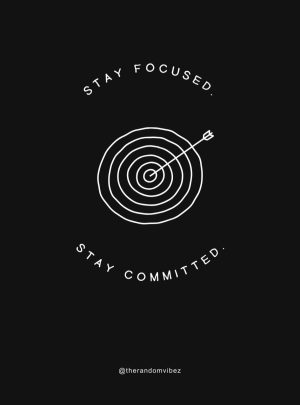
Why Can’t I Focus?
I often wonder; “Why can’t I focus?” It’s a common puzzle we all face in today’s whirlwind of constant notifications and endless to-dos.
Now, this is a common question for a lot of people. Whenever you are unable to complete the smallest of tasks or try to work on too many things at once, you’re likely to ask this question.
And usually, the answer can be found in your daily routine and in certain things that you can easily control. A few of these activities that stop you from concentrating on your work include:
- Inadequate sleep or irregular sleep patterns.
- Internal turmoil like fear, anxiety, and stress about the future or past.
- Overthinking patterns.
- Being overly stressed or feeling overwhelmed by too much work pressure.
- Being distracted by something in your environment.
- Lack of physical activity throughout the day makes you feel lethargic.
- Lack of clear goals and not knowing which task needs to be completed first.
- Digital distractions: Round-the-clock notifications from social media, smartphones, and emails.
- Having a poor lifestyle that includes missed meals, less water intake, or excessive alcohol consumption can lead to fatigue, lethargy, and dehydration.
These are a few examples of reasons why you are not being able to concentrate and focus on your work. Working on improving these activities can help you to stay away from distractions and stay mentally focused on your work.
In today’s world, staying focused on one task can be difficult, especially when there are constant distractions like social media notifications and the latest news updates just a click away. It’s normal to get distracted by these things.
But staying focused is very essential for success and it’s not about blocking out everything else, but about giving your full attention to what’s important at that moment.
If goals are the final destination then focus is the roadmap to that destination. The ability to focus is one of the factors that play an important role in whether you achieve success or failure.
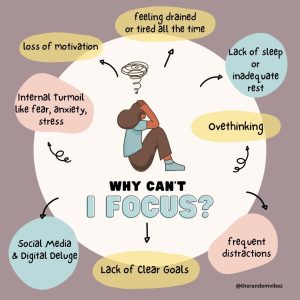
Why Is Focus Important?
Time slips away like sand through our fingers when focus is lacking, translating into poor time management skills. This leaves us with a daunting list of pending tasks and minimal time to address them effectively.
“The successful warrior is the average man, with laser-like focus.” — Bruce Lee
Focus is a cornerstone of effective functioning, influencing various aspects of our personal and professional lives. From productivity to stress management, the ability to concentrate on tasks plays a vital role in achieving positive outcomes.
- Productivity: Enables efficient and accurate work.
- Quality of Work: Leads to higher-quality outcomes.
- Time Management: Facilitates effective task prioritization and deadline adherence.
- Problem Solving: Enhances analytical and problem-solving skills.
- Reduced Stress: Minimizes stress by avoiding multitasking and distractions.
- Learning and Retention: Aids in better understanding and retention of information.
- Effective Communication: Improves active listening and clear communication.
- Goal Achievement: Essential for a focused effort toward long-term objectives.
- Creativity: Immersing in tasks enhances creative thinking.
- Work Satisfaction: Completing tasks with focus promotes job satisfaction.
In essence, the importance of focus cannot be overstated. It is the linchpin that ensures efficient use of time, energy, and cognitive resources, contributing to both personal and professional success.
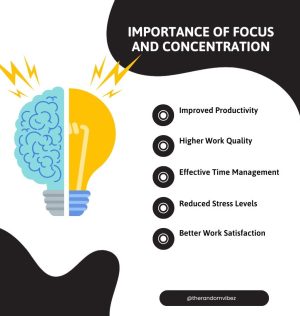
10 Best Ways To Focus Better And Improve Your Concentration
Now that you know the importance of concentration in life, here are a few tips that can guide you to achieve success by eliminating distractions and focusing on what is important.
1. Set And Prioritize Your Goals
As it is commonly said first things first. Setting and prioritizing your goals gives you clarity of what needs to be accomplished first. It prevents you from getting lost in a bucket of tasks and allows you to channel your energy where it matters the most. It helps you to allocate your time and resources effectively to achieve better productivity and results.
Make a to-do list every day and set the tone for the day. Schedule the most important activities first and try to stick to your routine without any detours.
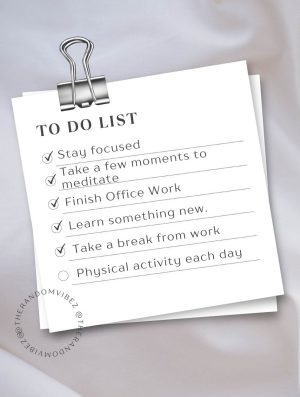
2. Digital Deluge – Eliminate Distractions
The 21st century has gifted us with incredible technological advancements, but it has also introduced a constant stream of digital distractions. Smartphones, social media, and the ever-present notifications create a landscape where staying focused feels like an uphill battle.
Focus Tip: Designate specific times for checking emails and social media. Turn off non-essential notifications to minimize distractions during work or study sessions. Consider using apps that temporarily block distracting websites during focused work periods. This will help you to minimize distractions and focus better on your work.
Shutting off disturbances both from internal and external factors can help you to concentrate.
It’s practically not possible to get rid of everything but taking steps to reduce them as much as possible will help you work more effectively. Going to a quieter place, and keeping your phone away from sight are some simple ways to keep away from distractions.

3. The Multitasking Myth
Many of us pride ourselves on being multitaskers, but the reality is that our brains aren’t wired to juggle multiple tasks simultaneously. Attempting to do so often leads to a decreased focus on each specific task, hindering overall productivity.
I used to multitask with multiple open tabs, working on various projects simultaneously. However, when I switched to focusing on one project at a time, I noticed a significant improvement in the quality of my work. It not only helped me complete tasks faster but also made the overall process smoother.
Since then, I’ve made a habit of concentrating on one thing at a time for better results.
I realized that juggling multiple tasks simultaneously can be stressful and overwhelming. Focusing on one thing at a time can reduce stress levels and make your work more enjoyable.
Focus Tip: Prioritize tasks based on importance and deadlines. Tackling one task at a time allows you to give your full attention to each, resulting in higher-quality work. Utilize tools like to-do lists or project management apps to keep tasks organized.
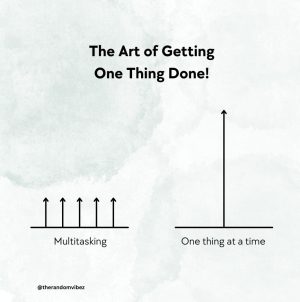
4. Avoid Fatigue and Burnout – Relax & Recharge
Our ability to focus diminishes when we’re physically or mentally exhausted. A lack of proper sleep, overworking, or neglecting self-care can lead to burnout, leaving us unable to concentrate effectively.
Focus Tip: Prioritize sleep by maintaining a consistent sleep schedule. Break your day into manageable chunks with breaks to prevent burnout and maintain sustained focus.
Many people use the concept of power naps (brief sleep of 5-10 mins) to enhance their performance. According to the National Library of Medicine, Power Naps can reduce sleepiness and improve cognitive performance. The benefits of brief naps are almost immediate after the nap and last a limited period (1-3h).
Practice self-care activities, such as exercise or relaxation techniques, to recharge both physically and mentally. This will help you to perform your tasks better and increase productivity.
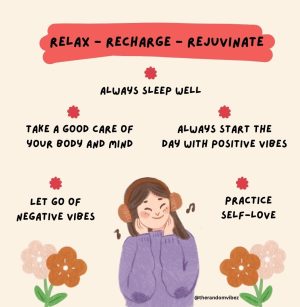
5. Practice Mindfulness
Mental Focus is a skill; therefore it can be improved with the practice of meditation and mindfulness. Mindfulness is the practice of gently focusing your awareness on the present moment over and over again. It is to be conscious of what’s happening “now”.
With constant practice of meditation, yoga, and other techniques, you can reduce the impact of distractions and bring your focus back to the present. Being mindful will give you more mental clarity, calm your mind, relax your body, and help you to improve your concentration.
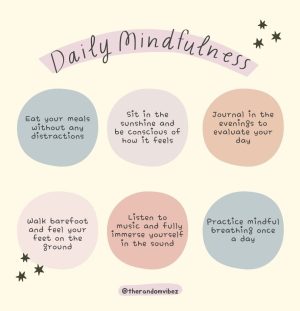
6. Take Short Breaks
When faced with a long, monotonous task, maintaining focus can be challenging. Taking brief breaks can significantly improve your mental concentration. Whether it’s a short stroll, a quick chat, or diverting your attention to something unrelated, these small pauses can refresh your mind.
The Pomodoro Technique, working for 25 minutes followed by a five-minute break, is an effective way to enhance focus. After four cycles, you can extend your break to 15-30 minutes.
Incorporating these short breaks helps rejuvenate your mind, ensuring you return to your task with renewed focus and heightened performance.
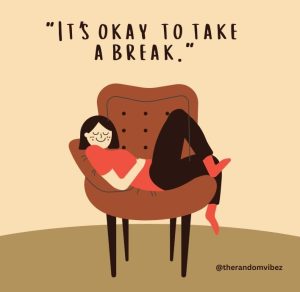
7. Exercise – Activate Your Mind & Body
Exercise is a key ally in sharpening focus. It does wonders for our brains by increasing oxygen and blood flow, making them more alert and robust.
Indulging in regular physical activity also plays a significant role in reducing stress and anxiety, common distractions that hinder focus.
Research has demonstrated that exercise has an immediate positive effect on crucial neurotransmitters—dopamine, norepinephrine, and serotonin—all integral to attention and focus.
So, for those aiming to enhance concentration, a bit of physical activity can go a long way. Get up, move, and enjoy the benefits of a more focused mind.
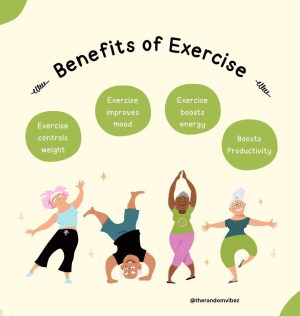
8. Train Your Mind
Scientific research states that engaging in various brain training activities and brain training games is a great way to enhance your cognitive abilities, including your ability to stay focused. Some such games include jigsaw puzzles, sudoku, chess, and brain-stimulating video games.
As you train your mind in these activities, you cultivate a disciplined and attentive mindset, naturally enhancing your ability to concentrate on the task at hand. This intentional mental training can bring about a positive shift in your overall focus and cognitive prowess.
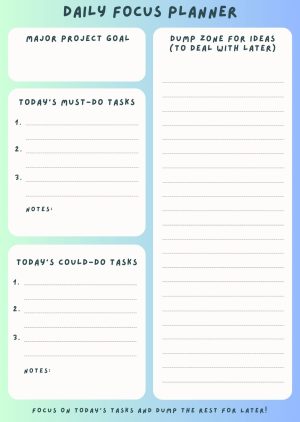
Conclusion
Whether you are a student, employee, or businessman, dealing with a lot of work, lack of sleep, or just lack of motivation on a Monday morning, not being able to focus can hamper your productivity.
So it’s important to have a few tips on your fingertips, like the one I mentioned above, to know what can be done to get back on track and focus more on work.
It’s time to embrace the journey of cultivating focus, recognizing that each step taken brings you closer to a more attentive and accomplished self. Best of luck in honing the invaluable skill of sustained concentration.




